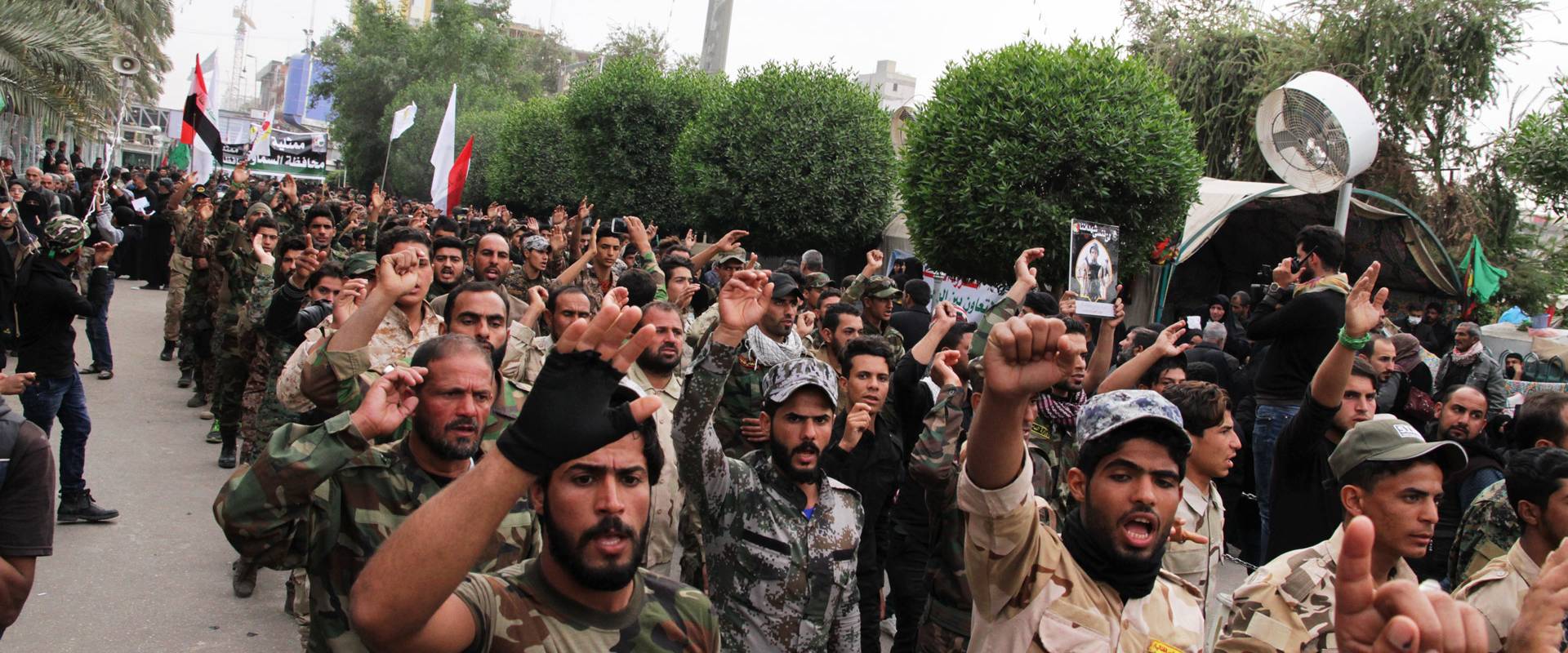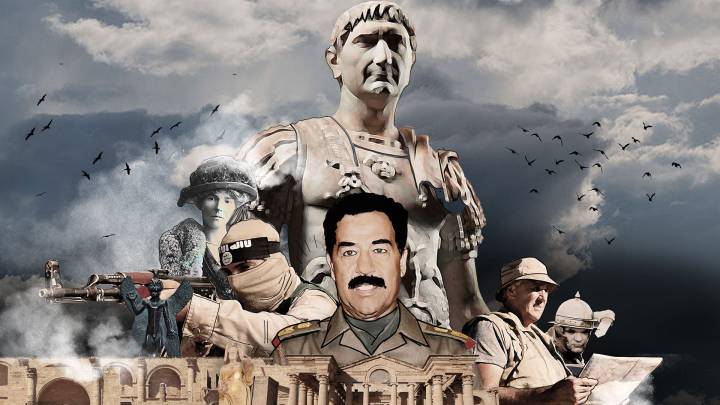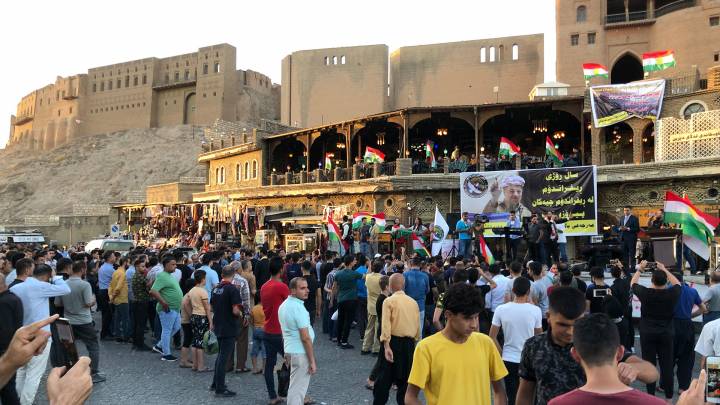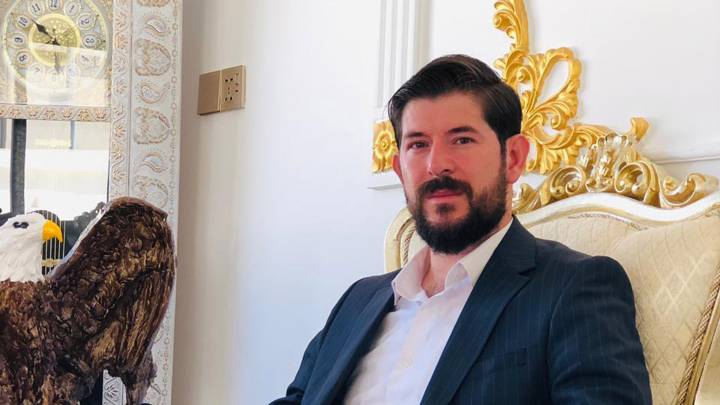Can Muqtada al-Sadr ‘Oz’ his way out of the Green Zone Debacle?
Frustrated over being sidelined by his rivals after a nine-month struggle to lead the government formation in Iraq, on July 30 Shi’ite cleric Muqtada al-Sadr mobilized his supporters to march into Baghdad’s high-security Green Zone area and occupy the heart of the country’s fragile democracy – the Iraqi parliament. The move was clearly meant to prevent Sadr’s opponents allied under the Shi’ite Coordination Framework (CF) from holding a parliamentary session on Saturday to elect a president and ideally crown their candidate for the Prime Minister’s post – Muhammad Shia al-Sudani.
Though while succeeding in bringing to a halt the CF’s bid to capitalize on the Sadrist MPs’ unexpected resignation from parliament as announced on June 13, Sadr’s gambit may as well backfire. In view of Sadr’s often overestimated ability to navigate the masses, such consecutive bluffs risk alienating large parts of the Iraqi street who might grow weary of the cleric’s adventurist take on the hopelessly deadlocked political process. The question thus remains whether the wizard of Iraqi protest politics will succeed this time to tweet his way out of the current stalemate without exposing too much his own inability to reform the established power-sharing system.
Sadr’s self-made trap
It has been nearly seven months since the newly-minted MPs from al-Sadr’s victorious Sa’iroun (Marching Forward) coalition entered the parliament building wrapped in their symbolic white cloaks meant to demonstrate their historic commitment to martyrdom and sacrifice. Despite having conquered 74 out of the 329 parliamentary seats, rendering them the largest block, the Sadrists were soon forced to live up to their self-sacrificial commitment. Giving up on his ambitious intentions to shake up the consensus-based logic of Iraqi government formation, on June 13 Sadr ordered all his representatives to resign from parliament.
Since his victory in the October 2021 elections following a carefully engineered political campaign, Sadr has been uncompromisingly working to launch the country’s first national majority government. Though reluctant to come to terms with his archrival Nouri al-Maliki, Sadr did not succeed in his attempts to convince prominent stakeholders such as the Fatah leader Hadi al-Ameri or even his former comrade in arms, Qais al-Khazali to break from the Coordination Framework and to endorse the majority government initiative.
As Mike Fleet, an independent Iraqi politics analyst, elaborated in an interview with the author, “since Maliki's SoL (State of Law Coalition) had the most seats compared to the rest of the Coordination Framework, he could not be marginalized that easily by the other members. Further, no-one in the Coordination Framework wanted to budge and end up being swept up and rendered impotent by the Sadrist majority, so as to avoid a similar fate to that of the Iraqi Communist Party that had signed on with them in 2018. They recognized that they needed to stay together to remain a counterbalance to the Sadrists, or at least a blocking third, to try and force Sadr to a compromise government arrangement.”
Resisting the pressure from his political rivals determined to avoid the internal collapse of the Shi’ite powerhouse referred to as ‘bayt al-shi’i,’ Sadr allied himself with the Kurdistan Democratic Party (KDP) led by Masoud Barzani as well as with the Sunni Arab Sovereignty Coalition led by the Speaker of Parliament, Mohammed Halbousi. Forming the “Save the Homeland” alliance, the colorful trio entered the post-election battle ground with a resolve to revisit the business-as-usual horse-trading practices of Iraq’s parliamentocracy.
Though tempted to take advantage of the aspired reshuffle, Sadr’s partners from the KDP might have ventured a step to far by claiming for themselves the right to determine the next president of the republic – a privilege routinely reserved for their Kurdish competitors from the PUK. Being unable to reach an understanding for the Iraqi presidency and failing to break the ranks of the Coordination Framework, Sadr soon grew tired of the prolonged period of back-door negotiations. Moreover, his futile endeavors to challenge the sectarian quota or Muhasasa Ta’ifiya system were threatening to expose his limited scope of action delineated by the unwritten rules of semi-consociationalism.
Meanwhile, united under the Coordination Framework construct, his political opponents from within the Iran-leaning Shi’ite current managed to utilize their informal leverage over the judiciary branch to obstruct Sadr’s plans. Based on its interpretation of article 70 of the constitution, Iraq’s Supreme Federal Court arbitrated that the country’s president can only be elected with at least a two-third majority of MPs present in session, thereby preventing Sadr from acting as a kingmaker.
With both Barzani and Halbousi subjected to the intimidation tactics of the Coordination Framework, Sadr eventually decided to throw the ball into his rivals’ court. Therefore, despite achieving a significant win after pushing the Emergency Law for Food Security and Development through parliament, Sadr instructed his MPs to resign. Communicated as an act of sacrifice meant to unlock the current impasse, the resignation did not seem to play out as envisioned by Sadr.
Without any serious efforts to convince him to rethink his decision, his competitors from the Coordination Framework did not shy away from replacing the resigned MPs and cashing in on the Sadrists’ departure. Moreover, despite knowing that Nouri al-Maliki and his proteges still presented a red line for the cleric, the Coordination Framework nominated Maliki’s former minister of human rights, Mohammad Shia al-Sudani, as its candidate for the Prime Minister’s post.
Seeing the nomination as a provocation, Sadr did not hesitate to respond with a show of force and his followers were soon able to temporarily take the Iraqi parliament hostage. Up to this day, the Sadrists continue with their sit-in protest across Baghdad’s Green Zone and wait for further instructions and Twitter guidance from their icon.
Though while demonstrating Sadr’s virtuosity in mobilizing the grassroots base of his father’s movement, the maneuver does not appear to be based on a well-thought-out plan. As Benedict Robin-D'Cruz, Postdoctoral Fellow at Aarhus University, underlined in an interview with the author, Sadr has indeed invited other, non-Sadrist, protest groups to follow his lead as a “last chance to save Iraq”. Though while a surprising number of activist leaders from Iraq’s October Movement have voiced their support for Sadr’s call for comprehensive reforms, according to D'Cruz, “most are deeply skeptical of Sadr’s intensions, realising that Sadr is likely to turn against them, and crush their movement as he did in 2020, if they empower him in his confrontation with the Framework.”
Furthermore, the dissolution of parliament might require Sadr to compromise his radical demands for a total and immediate overhaul of the established system. Especially since many of the ‘old faces’ rhetorically rejected by Sadr would be required on board to pave the path to another early elections as advocated by the cleric. Commenting on Article 64 of the Iraqi constitution, Naseef Naeem, a prominent German scholar of Arab Constitutional Law, has pointed out that in order to dissolve the Council of Representatives, Sadr would need at least one third of the current MPs to bring up the motion and the majority of the MPs to vote in favor of it. According to Naeem, it remains a legally contentious matter, whether Prime Minister Mustafa al-Kadhimi is indeed entitled to request the dissolution of parliament himself, in view of his curtailed authority as the head of a caretaker government.
Furthermore, the lawfulness of the resignation of the Sadrist MPs is currently still being debated. As Naeem explains, “based on executive order Number 9 from 2005, the Iraqi law No. 6 regarding the replacement of members of the council of representatives from 2006 and later on amended by law No. 49 from 2007, postulates that in order for the resignation of MPs to be legally recognized, they have to have served at least a year in parliament.”
Though Naeem himself disagrees with the ethical logic of the law in question, he nevertheless recognizes the potential of such historically-enshrined legal ambiguities to create loopholes for competing decision-makers to reinterpret the rules of the game to their own advantage. To complicate matters, it is to be expected that many of the parties who had scored poorly in the last round would use this opportunity to renegotiate the new election law that had enabled Sadr to translate his comparatively low number of votes into parliamentary seats.
The Coordination Framework’s failure to coordinate
Meanwhile, contrary to what its name suggests, the Coordination Framework has not only proven unable to coordinate efficiently with the other political stakeholders let down by al-Sadr, but also seems to face some serious difficulties in projecting a united front. The ranks of the resistance old-timers appear to be cracking and two major trends have already manifested themselves. On one end of the spectrum, Nouri al-Maliki is still adamant to impose his preferences onto his allies and establish himself as the grey eminence of the internally heterogenous framework.
On the other hand, veteran pragmatists such as the Badr organization leader and head of the Fatah coalition, Hadi al-Ameri, have argued for a more reconciliatory approach. Having been himself several times on the verge of striking an agreement with al-Sadr, al-Ameri is now tasked by the Framework to explore dialogue opportunities with the cleric and ideally obtain his blessing to proceed with the formation of a broad consensus cabinet. Confronted with Sadr’s brinkmanship, even some of his former rivals such as Qais al-Khazali have opted to deescalate the tensions, thereby personally appealing to the participants of the Green Zone counter-protests to avoid violence and retreat from the scene.
These internal differences on how best to deal with the cleric’s affronts can be attributed to the fact that despite the shared interest of staying in power, the constitutive elements of the Framework have all been dealt different hands during the last round of elections. Having all sought to adapt to the new election law with varying degrees of success, these players are not equally ready to re-enter the race. On the one hand, those who misinterpreted the new election law are eager to either get another chance at reinventing their political campaigns or ideally get the election law revised altogether. On the other hand, actors like Maliki who have scored considerably higher number of seats than the Fatah coalition are not ready to risk what they have already reaped at the ballot box.
This is only understandable since five unsettling audio recordings recently leaked by journalist Ali Fadhil have severely damaged Maliki’s standing even amongst his customary allies from within the pro-Iranian wing. While resorting to sectarian reference frames and lashing out at Muqtada al-Sadr can be somehow ignored as part of al-Maliki’s usual repertoire, offending the leadership of the Popular Mobilization Forces (PMF) - also known as al-hashd al-sha’bi - for sure has not done him any favor. And while the wannabe godfather and self-proclaimed patron of the paramilitary umbrella still vehemently denies the trustworthiness of the leaked audio material, the PMFs have been so far smart enough to claim neutrality and use the on-going intra-Shi’ite rivalries for their own benefit.
The media directorate of the PMF has thus focused on advertising the paramilitary’s role as a reliable national security agency in service of the public and answering to the Prime Minister’s orders to operate as a buffer between the different protest groups within the contested Green Zone. Their communication strategy was clearly designed to divert the attention away from the stakes of an array of PMF-affiliated figures in the ongoing power play and thereby protect the brand and the state-funded benefits attached to it.
The Chosen Paralysis of the External Actors
Apart from the Special Representative of the United Nations Secretary-General for Iraq, Jeanine Hennis-Plasschaert, who has been meeting with various conflict parties, including the Shi’ite cleric Muqtada al-Sadr and the head of the Fatah alliance, Hadi al-Ameri, the international community has primarily exercised self-restraint.
Despite the extra-legal approach of the Sadrists to achieve what the cleric has sought to frame as ‘a democratic and peaceful revolution,’ there have been no direct official condemnations of the daring move to undermine Iraq’s legislative branch. Indeed, for external observers, some of the pictures capturing the Sadrists’ takeover of the parliament might have evoked disturbing memories of the shocking invasion of the U.S. Capitol building by supporters of the former President Donald Trump. Nevertheless, most of Iraq’s western and Gulf partners have refrained from ill-timed criticism and have unanimously called for a comprehensive national dialogue.
Surprisingly, to those always anticipating some grand Iranian intervention, Iraq’s eastern neighbor has also preferred to remain comparatively balanced in its rhetoric, calling mainly on all the usual suspects from the Shi’ite powerhouse to resolve their differences in a constitutional manner. Aware of Iran’s controversial image in the eyes of the disillusioned Iraqi public, most of the Ayatollah’s men have kept their distance. Especially with Qassem Soleimani out of the picture, the Islamic Republic still lacks high-profile and charismatic envoys, able to mediate convincingly between all the competing Shi’ite parties and more importantly – to be accepted and respected by both Sadr as well as his opponents from the Coordination Framework.
The State at Stake
What none of the partisan competitors seem to acknowledge much in their power game is the drastically diminishing trust in the electoral process. Despite the record low voter turnout of not more than 43% - if not less - in the 2021 post-protest elections, the campaigning sides are failing to recognize that their constituencies might not see much purpose in casting yet another vote and lending validity to the internally fraught spoils-sharing equation.
On top, state authorities are still struggling to address the multiple challenges ahead – chronic nepotism, a stalled reconstruction process, crumbling infrastructure, a mockery of a healthcare system, sand and dust storms as a result of environmental degradation, and an imploding public sector. Indeed, the increase in oil prices might have provided the next administration with greater leeway and some additional petrodollars to tackle the issues at stake.
Though without an effective government finally passing a budget for 2022, the population’s socio-economic grievances are likely to remain unresolved. The biggest loser thus is no other than the Iraqi state itself. Meanwhile its chief wizard’s current tactic seems to be just pumping more hot air into an already inflated balloon with no clear end in sight.
Dr. Inna Rudolf is a Senior Research Fellow at the International Centre for the Study of Radicalisation (ICSR) and a postdoctoral Research Fellow at the Centre for the Study of Divided Societies. Within the XCEPT consortium, she is analysing the implications of identity politics and the mobilisation of violent memories in conflict-affected borderlands.




